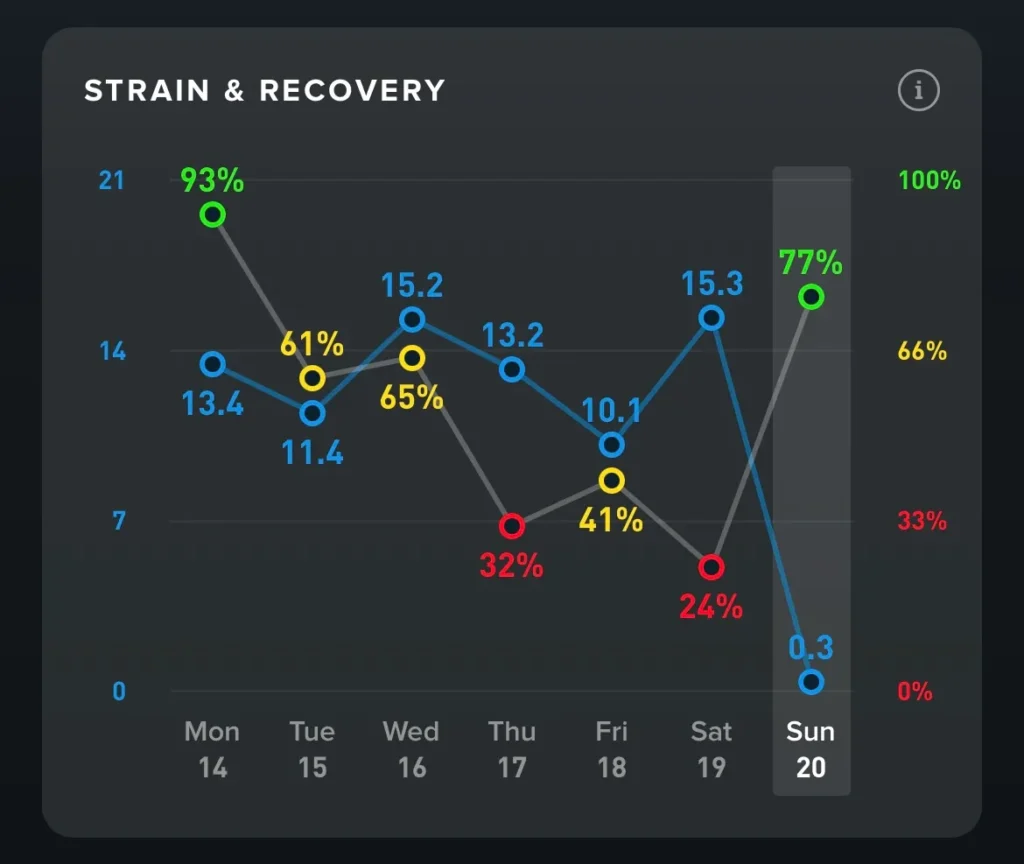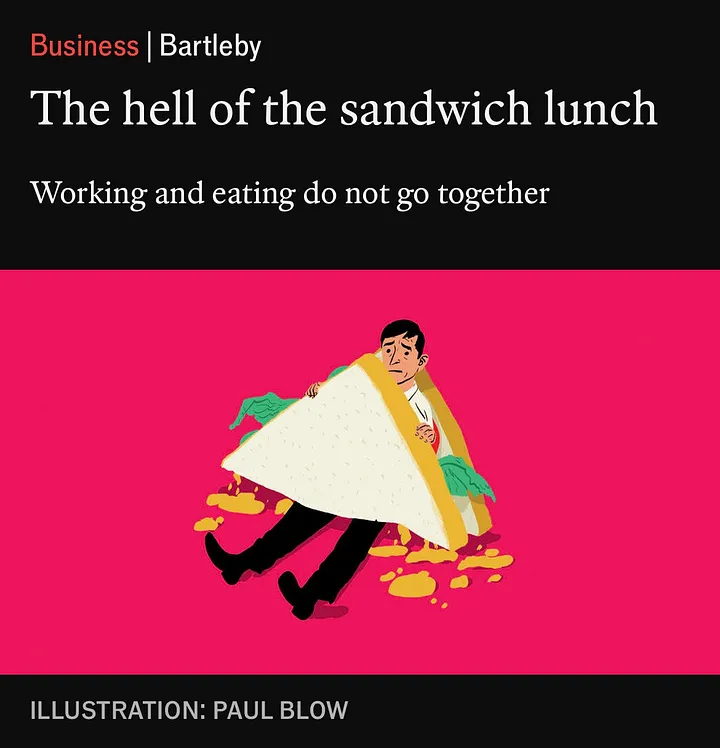Hey friends, how was your week?
For me, Monday was a holiday, so I returned to the office on Tuesday. This week had more afternoon meetings than usual. It was filled with movement and lots of food (both healthy and unhealthy).
Here’s to my 1500th.
1. From Feeling Exhausted on Friday
When my alarm went off at 6 a.m. on Friday, I felt so exhausted that I struggled to muster the energy to do anything. I was so tired that I even opted to work from home instead of heading into the office.
This kind of start to a Friday isn’t uncommon for me.
From Monday to Wednesday, I usually feel refreshed and look forward to the week ahead — it’s a good sign that I’m happy with what I do. However, by Friday, I’m already worn out, eagerly waiting to dive back into bed without having to set an alarm for the next morning.
Despite having several things I wanted to accomplish last Friday, I found myself completely unproductive.
This feeling aligned with the data from my health tracker, which I wear on my wrist. The graph shows my recovery levels in green, yellow, and red.
Last week, I was in the green at the start, indicating that I was well-recovered and ready to perform at my best. However, by midweek, I was in the red, signaling that my body needed rest and was struggling to recover.

This prompted me to reflect:
What happens in the first half of the week that leaves me drained by the second half? What’s taking away my energy?
After ten minutes of introspection, a couple of things came to mind:
Intense Kickboxing Schedule:
Although it’s an activity that makes my heart race, four sessions (Sunday, Monday, Tuesday, and Thursday) were a bit too much for my body to manage comfortably.
Considering I also run every morning, it felt like I spent too much time exercising and not enough time recovering.
Poor Sleep Quality:
I realized that my sleep quality suffered because I brought my iPhone to bed, spent time writing on my laptop, or mindlessly scrolling through social media. The blue light kept me awake, and even when I tried to close my eyes, I couldn’t fall asleep easily.
Also, I often ate dinner too close to bedtime, which I know isn’t ideal. I need to reassess my bedtime routine to help my body switch into sleep mode more effectively.
New Shoes Causing Blisters:
At the beginning of the week, I wore new boots instead of my usual sneakers, excited by the arrival of cooler autumn weather.
Unfortunately, the boots caused blisters on my heels, a predictable pain for me when breaking into new shoes. When I got home, I felt more fatigued than usual.
This experience reminded me how essential comfortable shoes are for someone as active as I am.
So, good that these “de-energizers” became clear to me. Now, I have a plan for next week:
I’ll limit kickboxing to three times a week, avoid screen time in bed, refrain from going to bed with a full stomach, and prioritize comfort when choosing shoes (wearing new ones only on weekends).
I’m hopeful for better Fridays ahead!
2. From listening to Angels Like You by Miley Cyrus

I don’t remember whether it was on Instagram or another social media platform, but I came across a rehearsal video of Miley Cyrus before the Super Bowl.
Intrigued, I added her song to my Spotify playlist and listened to it on repeat while running on the treadmill the next morning. That’s when I noticed a particularly striking lyric.
“Won’t call me by name, only baby”
For many Japanese people, being called “baby” by someone you like is generally seen as a positive thing.
In fact, for many Japanese women, it can be a “heart-fluttering” moment that they often don’t experience with Japanese men.
I was one of those women. When my ex-boyfriend called me “baby,” it made me feel a bit shy but also incredibly special, signaling that we were close.
However, what Miley conveys in “Angels Like You” feels quite the opposite.
Her message isn’t about these heart-fluttering moments.
It’s rather the opposite. it’s about the importance of being called by your name.
For her, being called by your name, rather than “baby,” is a sign of respect and a crucial part of your identity, reflecting how much the other person values you.
Being called by your name instead of “baby” is a genuinely sweet gesture that acknowledges you as an individual and demonstrates true interest, indicating that they are genuinely into you and treat you with decency and respect.
This beautiful politeness is something she expects her significant other to adopt, making it a fortunate experience in any relationship.
Running along, I was struck by Miley’s skill in creating such meaningful lyrics, and it prompted me to reflect on the nuances of relationships, leading me to recognize a slight sense of personal growth.
3. From My Current Reading
I am a fond reader of The Economist.
But, it is not so much for its informativeness; rather, it is for the humor infused in its writing.
As I was reading the September edition, I came across an article about lunchtime at workplaces.

- The article critiques the concept of a “sandwich lunch,” portraying it as a disastrous blend of work and dining, where the promise of food is overshadowed by the obligation to attend a meeting.
- It humorously details the unappealing food choices, awkward eating etiquette, and the struggle to participate in discussions while managing messy sandwiches, emphasizing the discomfort of eating under pressure.
- The piece explores the unspoken rules of sharing food in a work setting, highlighting how the fear of looking greedy leads to a lack of actual eating, ultimately resulting in wasted food and a collective decision to focus on work instead.
There were lines that made me laugh out loud in public, making me think, “That’s so true!” For example:
Your colleagues have now absorbed the risk of eating crisps. But danger lurks everywhere. In fact, the whole thing is an extended lesson on the perils of eating and working. Someone attempts to spear a tomato with a plastic fork and it zooms across the table like a precision-guided missile, seeking out the lap of their manager. Someone else takes a bite of a beef sandwich and realises too late that there is no way human incisors are going to be able to tear through it; they end up with a perplexed expression and a carcass hanging out of their mouth. Another colleague has managed to spill unimaginable quantities of egg on the table and uses a napkin to smear it everywhere. Jackson Pollock would have been pleased with the results.
And I found many relatable moments when comparing this to lunchtime in Japanese workplaces. It’s very much like this.
Here’s my version based on my experience:
Do people in Japan usually bring lunch to work or go out to eat lunch?
We bring lunch to work.
But it is for a reason.
It’s lunchtime.
Around you, your colleagues are taking their lunchboxes out of their bags to eat at their desks or heading to the break room with bento boxes and vegetable juice they bought from the convenience store during their morning commute.
Amidst them, you, who haven’t brought lunch, find yourself rubbing your stomach, pondering what to eat. Having overslept a bit this morning and rushed out of the house without breakfast, your stomach, already empty from skipping your morning meal, grumbles.
As you stand up from your seat and put on the jacket draped over the backrest, your boss, walking out of the meeting room, invites you to lunch.
“Hey, perfect timing. Let’s go grab lunch, shall we?”
If you are not bringing lunch, you have no excuse to refuse this invitation. You lock eyes with colleagues from the opposite seat.
They brought their lunches for a reason.
Lunch with your boss is an extension of work. As a professional, you are expected to show the minimum required consideration as part of your job:
You must know your seat and your role: The seat of honor is typically furthest from the venue’s entrance, reserved for seniors or officials. Hence, at lunch, you, as a junior, should always opt for the “lower seat.” Sitting in the seat of honor as a newcomer will appear inconsiderate or a breach of etiquette. Seniors should choose the menu first, so adjust its angle for easier reading. Also, distribute wet towels or small plates if provided, and fetch water if it’s self-service.
You don’t eat before your boss: At meals with your boss, you should know enough to wait until everyone’s dishes have been served before eating. So even if your order arrives before your boss’s, digging in first is considered rude. Even if your boss says, “You can start eating,” wait a while. Except, if your boss’s order arrives first, offering them to start with a phrase like “Please, go ahead and start” shows thoughtfulness and leaves a good impression.
Your order must be the same price or lower than your boss’s: When your boss treats you to lunch, take cues from their menu choices and select similarly priced dishes. However, if you’re too hesitant and choose a dish that’s too cheap, your boss might mistakenly think you consider them stingy, which could hurt their feelings. If unsure, ask, “What do you recommend at this restaurant?” and order based on their advice. Even if you intend to pay for yourself, your boss is inviting you intending to treat you. Refusing their treat would be considered rude. If your boss offers to pay, accept it with grace.
The important thing is not to be considerate but to not make your boss feel obligated.
After returning from lunch, you take advantage of your boss in the restroom and go to the convenience store in the neighboring building to buy a pastry and coffee milk.
Sitting in the eat-in area, you stuff the pastry into your mouth and wash it down with the coffee milk, finally feeling a sense of relief in your heart and satisfaction in your stomach.
“Phew.”
After taking a deep breath, you return to your workplace next door.
We bring lunch to work.
And this is the reason.
I hope the week treated you well.
If you’re new here, follow along for more reflections and lessons.
Catch you next week!